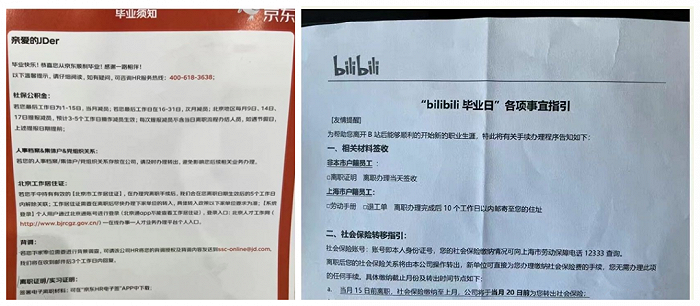The Chinese online community is causing controversy when the layoff notices of some Chinese technology companies have replaced the phrase “Sorry, your contract has been terminated” with “Congratulations, you have graduated”.
Although it is customary for large companies in this country to describe layoffs as “optimizing” their business, the use of the term “graduation” in pink slips (notices of layoffs are often pink) posted on social media recently by some employees, causing outrage. The controversy has raged at a time when the tech industry is steadily cutting jobs across the board.
Share from an employee fired by Jingdong (the owner of the e-commerce website JDcom) shows the letter with the content “Congratulations on your successful graduation” and provide detailed information on how to handle social security issues, employment records and other personnel matters. And Bilibili’s dismissal letter is titled “Graduation Date”, and provide guidance on similar personnel matters.

Letter of dismissal from Jingdong and Bilibili sent to employees.
The authenticity of the letters has been confirmed by both current and former employees of the company. But they said the phrases were the default that applied to all those who had left, including those who voluntarily resigned.
Treating work colleagues as “schoolmates” is part of the company culture at many Chinese tech corporations, including ByteDance, the owner of the TikTok app. This is theoretically intended to create an organizational image with little separation between management and employees.
Jingdong and Bilibili did not immediately respond to requests for comment.

A worker prepares a package for delivery at a distribution center in Jingdong. Photo: AFP
The layoffs at Jingdong mainly belong to its subsidiary Jingxi, which is expected to lay off 10 to 15% of its employees, or about 400 to 600 people. Another business unit that sells books, pet products and cross-border e-commerce on the company’s main site has also planned to cut staff by 15 to 20 percent.
Bilibili’s layoffs began late last year and mainly belonged to the games business, where nearly 20% of employees were laid off.
In 2021, Jingdong reported an operating profit of $600 million, down 66.7% year-on-year, despite a 27.6% increase in net sales. Bilibili’s net loss more than doubled to 6.8 billion yuan last year. Total net revenue grew 62%, but revenue from the mobile game segment grew only 6%.

The Bilibili logo is seen at the China Digital Entertainment Expo and Conference in Shanghai, July 30, 2021. Photo: Reuters
Some social media users were angry when these companies used the term “graduation”. A Weibo user named Shuaishixiong sarcastically said that Jingdong “too benevolent” for paying the staff but “don’t ask them to pay tuition.” Another user, Maoxiaogun, asked why it’s okay to get fired from an employee.
However, there are also those who accept the term. One Weibo user said that all those who leave Jingdong are called “graduates”, regardless of whether they are fired or resigned. “Does the work experience one receives before leaving a job not count as personal development?”, this person asked.
In fact, using the term graduation to refer to layoffs is not limited to China’s tech industry. As early as 2016, an article in The New York Times mentioned a software developer in the US who used the same term when firing employees.
The Beijing government has waged a campaign that has dragged on for more than a year to overhaul the tech sector. All control policies are implemented in the name of “restrain the unreasonable expansion of capital”.
This has taken a heavy toll on large corporations and is now casting a shadow over the job market. The country’s two largest tech companies, Alibaba with more than a quarter million employees and Tencent with 107,000 employees, are said to be in the process of cutting thousands of jobs.
Refer SCMP
